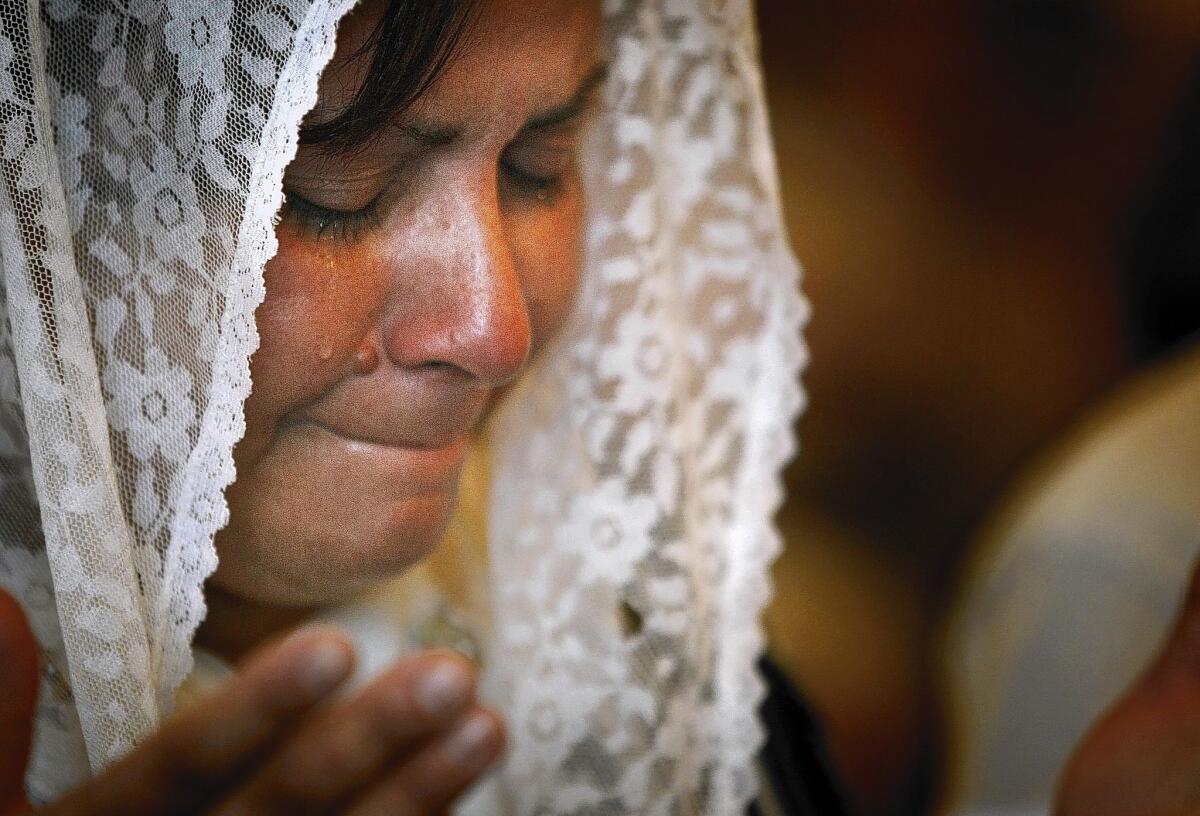Iraqi Christians in San Diego County fear U.S. airstrikes are too late

- Share via
EL CAJON, Calif. — One of the biblical readings at the Sunday Mass at Our Mother of Perpetual Help Syriac Catholic Church here contained a passage from Ephesians, complete with the warning “do not leave room for the devil.”
The passage had a particular poignancy for the 300-plus parishioners attending the overflow Mass because, as one parishioner explained, “The devil is loose in our homeland.”
All but a handful of the parish families are recent immigrants from Iraq. A church service in Arabic and Aramaic makes them feel more at home in their new country.
But most have relatives and close friends trapped in the northern part of Iraq, which is under attack by Sunni Islamic militants who are sworn enemies of Christianity and Christians.
A sign outside the church has a simple plea, “Save Iraqi Christians.” Small American flags adorn the iron fence.
A woman sitting beside her husband and two children wept during much of the Mass. The family had recently fled the escalating violence in Baghdad.
“My wife is crying for the people left behind in Mosul,” said her husband. He declined to say more or give the family name lest relatives in Iraq be targeted for killing.
Militants recently destroyed a Syriac church in Mosul, a center of Christian life in Iraq for centuries. Roman Catholics in Mosul were forced to flee to Irbil, the Kurdish capital now being protected by the U.S. airstrikes that President Obama authorized late last week.
“They had a half-hour to escape,” said Maryann Dalal, 25, a recent immigrant and now a student at San Diego State. “They lost everything: homes, jobs, savings, lives. Now they are in Irbil, where there is nothing for them.”
After the service, parishioners said they fear the U.S. intervention has come too late.
“It’s terrible there,” said Sabah Peter, 63, who served as a translator for the U.S. Army in Iraq. “Everyone is afraid. It’s over for them.”
The leader of the Syriac Catholic Church, during a trip to North America, called for Western nations to use diplomatic and political power to save Iraqi Christians. “It is a question of our survival,” said Patriarch Mar Ignatius Joseph III Younan, who is based in Lebanon.
Even before the Islamic State takeover of much of the northern region in Iraq, violence has stalked the Syriac Catholic Church.
In the foyer of Our Mother of Perpetual Help Syriac Catholic Church is a small slice of granite from a Syriac church in Baghdad destroyed by militants in 2010. Next to the granite are pictures of 47 persons killed in the attack.
“They are martyrs, all of them,” said the El Cajon church’s pastor, Msgr. Emad Hanna Al-Shaikh.
Our Mother of Perpetual Help Syriac Catholic Church is part of a large Iraqi immigrant community in eastern San Diego County that includes Muslims, Chaldean Christians, Kurds and others. The community is second only to Detroit in numbers of Iraqi immigrants.
For weeks, community leaders here have warned of the danger posed by the Islamic State and have pleaded for the White House to intervene.
Now much of their attention will shift to encouraging the U.S. government, the United Nations and non-governmental groups to arrange passage for Christians to safe havens in Europe or the United States.
Mark Arabo, 31, a U.S.-born Chaldean Christian and executive of the El Cajon-based Neighborhood Market Assn., was a leader in the lobbying effort to convince the Obama administration to use air power to stop the slaughter. He was exultant last week when Obama announced the airstrikes but said that it was “only a beginning.”
Arabo and other Iraqi community leaders — including Johnny Oram, president of the San Diego-based Chaldean American Chamber of Commerce of California — plan to travel this week to New York to meet with United Nations officials.
They want an emergency immigration plan for endangered Iraqi Christians — which could increase the immigrant population here.
Although parishioners supported the Obama administration to authorize airstrikes against the Islamic State, they were also blunt in their assessment that the chaos in Iraq is the result of the U.S. invasion in 2003.
“What we are seeing now is because of the war,” said Fawaz Yaqoub, 54. “The U.S. changed everything over there. Now it should go back and change things back, to truly prove that the U.S. is a powerful country with truly humanitarian values.”
Fady Amin, 36, said that reporters “should help our voices be heard. Tell the U.S. government that it caused terrible things and should take responsibility for what it did.”
Pastor Al-Shaikh, who was baptized in 1955 at the church in Mosul that was recently destroyed, was more circumspect in his analysis. His sermon included the words “Obama” and “Mosul” amid rapid-fire Arabic.
“The U.S. took away Saddam Hussein and that was very important to us,” he said in English after the Mass concluded. “But when they went away, they didn’t leave good people in control.”
As parishioners drifted away, the pastor and several leaders of the congregation returned to the parish office to discuss politics.
A visitor suggested that, with luck, further tragedies like the destruction in Mosul may be avoided.
“Inshallah,” said the group, which translates to “God willing” in Arabic. “Inshallah.”
Twitter: @LATsandiego
More to Read
Sign up for Essential California
The most important California stories and recommendations in your inbox every morning.
You may occasionally receive promotional content from the Los Angeles Times.













